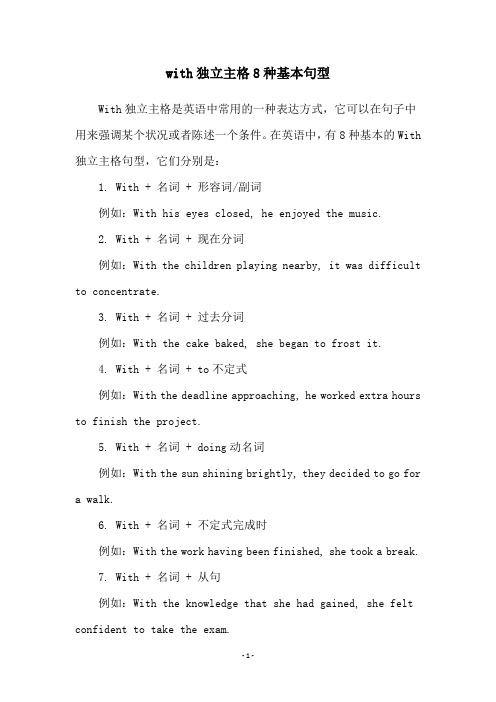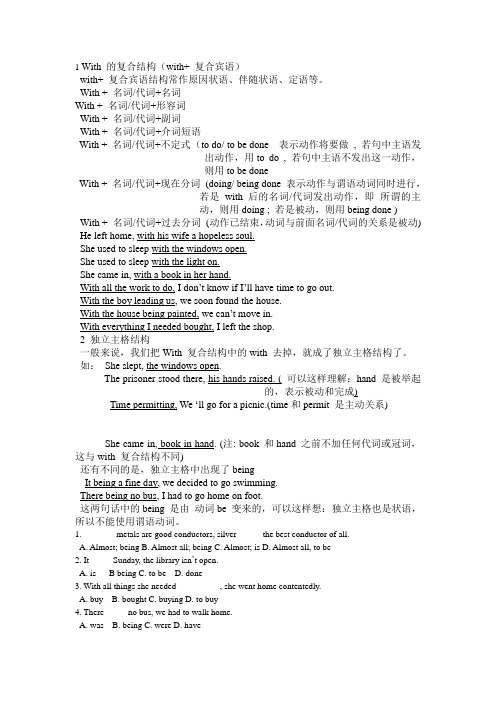独立主格结构完整版with
with的复合结构和独立主格结构

1.with+宾语+形容词。
比如:. The boy wore a shirt with the neck open, showing his bare chest. 那男孩儿穿着一件衬衫,颈部敞开,露出光光的胸膛。
Don’t talk with your mouth full. 嘴里有食物时不要讲话。
2.with+宾语+副词。
比如:She followed the guide with her head down. 她低着头,跟在导游之后。
What a lonely world it will be with you away. 你不在,多没劲儿呀!3.with+宾语+过去分词。
比如:He was listening to the music with his eyes half closed. 他眼睛半闭着听音乐。
She sat with her head bent. 她低着头坐着。
4.with+宾语+现在分词。
比如:With winter coming, it’s time to buy warm clothes. 冬天到了,该买些保暖的衣服了。
He soon fell asleep with the light still burning. 他很快就睡着了,(可)灯还亮着。
5.with+宾语+介词短语。
比如:He was asleep with his head on his arms. 他的头枕在臂膀上睡着了。
The young lady came in, with her two- year-old son in her arms. 那位年轻的女士进来了,怀里抱着两岁的孩子。
6.with+宾语+动词不定式。
比如:With nothing to do in the afternoon, I went to see a film. 下午无事可做,我就去看了场电影。
Sorry, I can’t go out with all these dishes to wash. 很抱歉,有这么多盘子要洗,我不能出去。
with引导的独立主格结构

在 句 子 中只作状 语 , 但 是可 以表 示伴 随 、 方式、 原因、 结果等 各种 复 杂 的情
况 。现 将w i t h  ̄ I 导 的独 立 主格 结构 加 以小结 。
一
、
句 法结 构
结 构一 : w i t h+ 名 词( 代 词) + 介词短 语 例句: He s a t t h e r e t h i n k i n g , w i t h h i s c h i n o n h i s h a n d . 他 手 托下 巴, 坐 在
的皇 帝一丝 不挂地 行进 在游行 队伍 中 。
T h e n a u g h t y b o y s t o o d b e f o r e h i s t e a c h e r w i t h h i s h e a d d o w n . 这 个 淘 气
的男孩 低着 头站在 老师 面前 。 He p u t o n h i s s o c k s w i t h t h e w r o n g s i d e o u t . 他 把袜 子穿 反 了。
结构四: t h+ 名词( 代词) + 名词
例句 : S h e u s e d t o s i t r e a d i n g i n t h e e v e n i n g w i t h h e r p e t d o g h e r o n l y
玛 丽靠 近火 炉坐 着 , 背对 着 门 。
结构 二 : w i t h+ 名 词( 代词 ) + 形 容词 例句: H e s t a r e d a t h i s f r i e n d w i t h h i s m o u t h w i d e o p e n . 他 张大 嘴 巴凝视
with独立主格用法

“with”独立主格用法是英语语法中一种独特且富有表现力的结构,它允许我们在一个句子中表达两个相关但逻辑上独立的思想。
这种结构在语法上被称为“独立主格”,是因为它包含一个名词或代词(称为主格),后面跟随一个描述或说明这个名词或代词的短语或子句。
“with”独立主格的基本结构是“with + 主格 + -ing/-ed/-to do等形式”,其中主格通常是名词或代词,表示某人或某物,而-ing/-ed/-to do等形式则描述主格的状态、动作或即将发生的动作。
这种结构可以用来表示原因、伴随情况、方式、条件等。
首先,“with”独立主格可以用来表示原因。
例如,“With the weather being so hot,we decided to stay at home。
”(天气这么热,我们决定呆在家里。
)在这个句子中,“with”引导的独立主格“the weather being so hot”表示了“stay at home”的原因。
其次,“with”独立主格也可以用来表示伴随情况。
例如,“She walked into the room,with her nose red from the cold。
”(她走进了房间,鼻子冻得通红。
)在这个句子中,“with”引导的独立主格“her nose red from the cold”描述了“walked into the room”的伴随情况。
再者,“with”独立主格可以用来表示方式或条件。
例如,“With more time,I could have done it better。
”(如果有更多的时间,我可能会做得更好。
)在这个句子中,“with”引导的独立主格“more time”表示了一种条件,而“I could have done it better”则是基于这个条件的结果。
总的来说,“with”独立主格是一种富有表现力的语法结构,它使我们能够在一个句子中表达两个相关但逻辑上独立的思想,从而丰富我们的语言表达。
with结构

Don’t talk with your mouth full . 嘴里满是东西,不要说话。
2) with + n + adv.
With Tom away, I always feel lonely . Tom不在,我一直感觉孤独。
With the radio on , grandma fell asleep in the chair . 收音机开着,奶奶在椅子里沉沉的睡着了.
5) with + Байду номын сангаас + to do
With so many problems to settle, the new manager was so worried. 有着太多问题去处理,新经理如此担忧.
6) with + n + prep.
The man left the meeting with a book in his hand . 这个男士手里拿着书离开了会议。
3) with + n + P.P
The peasants have a good harvest with all the crops got in . 庄稼都收割了,农民们有了一个好收成。
4) with + n + v-ing She lives in the room with the light burning. 她住在亮着灯的那个房间里.
With 结构
with复合结构又叫独立主格结构
with + n. + adj. with + n. + adv. with + n. + P.P with + n + v-ing with + n. + to do with + n. + prep.
独立主格结构(完整版)with

She sat at the table, collar off, head down, and pen in position, ready to begin the long letter.
她坐在桌前,衣领已解掉,头低了下来,拿好钢 笔,准备开始写一封长信。
3.独立主格结构没有所有格形式 The chief-editor arriving, we began the
meeting. 主编来了,我们开始开会。
比较动名词复合结构: The chief-editor’s arriving made us
very surprised.
独立主格结构(完整版)with
5. ____, he put on his coat. A. It being cold B.B. It cold C. Being cold D. It having been cold
独立主格结构(完整版)with
5.名词或代词+介词短语 介词短语也是用来说明代词的性质特征或
所处的状态。如:
The soldiers dashed in, rifle in hand. 士兵们端着枪冲了进来。 He was waiting, his eyes on her back. 他在等着,眼睛望着她的背影。
present company excepted.
迄今全部完成任务的人很少,在座的人除外。
His cup broken, he used his bowl instead.
茶杯破了,他就用碗来代替。
独立主格结构(完整版)with
3. 名词或代词+不定式 名词或主格代词通常是动作的执行者,与不定式
With 独立主格结构

With 独立主格结构在高中英语学习中,with的独立主格结构,也称作with的复合结构,经常出现,学生对它的使用难以掌握。
它是由with+宾语+宾补(宾补通常是非谓语动词)组成。
句型简析:With独立主格结构(作定语或状语)(with都可以省略)1.with + n. + n.The workforce is made up of 400 workers, (with) most of them women.这些劳工由400人组成,其中大部分是女性。
2.with + n. + adj.The students were listening to the teacher, (with) their eyes wide open.这些学生在听老师(讲课),他们眼睛睁得大大的。
3.with + n. + adv.(With) The meeting over, we returned to the classroom.会议结束了,我们都返回教室。
4.(with) + n + prep-phraseThe soldier stood there, (with) (a) gun in (his) hand.士兵站在那边,手中拿着一把枪。
(当介词后的名词表示身体的某个部位时,可省略修饰成分)5.(with) + n. + to do/ to be done (表示将来动作)(With) The sports meeting to be held next week, we must get ready for it.下星期要开运动会,我们必须为此做准备。
(With) A lot of homework to do, Tom won’t really enjo y a good holiday.有很多功课要做,汤姆不会真正享受好的假期。
6.(with) + n. + doing/ being done (表示正在进行) / having done (强调动作已经完成)(With) Time permitting, we’ll visit another museum.时间允许的话,我们将参观另一家博物馆。
with引导的独立主格的用法

with引导的独立主格的用法with引导的独立主格结构(absolute phrase)是一种特殊的从句结构,用来修饰整个句子的主语或动词动作的状况。
该结构通常由介词with、现在分词或过去分词构成,形成一个独立的结构,与句子的主语或动词无直接的句法关系,但在意义上与句子整体紧密相关。
本文将介绍with引导的独立主格用法及其相关示例。
一、with引导的独立主格用法:1. 在with引导的独立主格结构中,动词一般采用现在分词(-ing形式)或过去分词(-ed形式)。
2. 独立主格结构常常用来表达时间、原因、方式、条件等状况。
二、with引导的独立主格结构的示例:1. 时间状况:- With the sun setting in the distance, we decided to end our hiking trip.(夕阳西下,我们决定结束我们的徒步旅行。
)- With winter approaching, she started to buy warm clothes for her children.(随着冬天的临近,她开始给孩子买暖和的衣服。
)2. 原因状况:- With everyone's support, we were able to complete the project successfully.(在大家的支持下,我们能够成功地完成这个项目。
)- With her brother's encouragement, she decided to pursue her dream of becoming a doctor.(在她兄弟的鼓励下,她决定追求成为一名医生的梦想。
)3. 方式状况:- With great care, the teacher explained the difficult concept to the students.(老师非常用心地向学生解释了这个难懂的概念。
with独立主格8种基本句型

with独立主格8种基本句型With独立主格是英语中常用的一种表达方式,它可以在句子中用来强调某个状况或者陈述一个条件。
在英语中,有8种基本的With 独立主格句型,它们分别是:1. With + 名词 + 形容词/副词例如:With his eyes closed, he enjoyed the music.2. With + 名词 + 现在分词例如:With the children playing nearby, it was difficult to concentrate.3. With + 名词 + 过去分词例如:With the cake baked, she began to frost it.4. With + 名词 + to不定式例如:With the deadline approaching, he worked extra hours to finish the project.5. With + 名词 + doing动名词例如:With the sun shining brightly, they decided to go fora walk.6. With + 名词 + 不定式完成时例如:With the work having been finished, she took a break.7. With + 名词 + 从句例如:With the knowledge that she had gained, she felt confident to take the exam.8. With + 名词 + 介词短语例如:With his hand on her shoulder, he reassured her that everything would be alright.这8种With独立主格句型在英语中使用非常广泛,可以用来表达各种不同的情境和意思。
学会运用它们,能够让我们的英语表达更加地流畅自然。
独立主格结构(完整版)with课件

02
独立主格结构的类型
名词性独立主格结构
总结词
名词性独立主格结构是由名词或名词短语构成的独立主格形式。
详细描述
名词性独立主格结构通常表示一种状态或情境,其中名词或名词短语作为主语 ,没有连接词连接主句,而是通过非谓语动词的形式与主句形成逻辑关系。
形容词性独立主格结构
总结词
形容词性独立主格结构是由形容词或 形容词短语构成的独立主格形式。
不定式性独立主格结构
总结词
不定式性独立主格结构是由不定式或不定式短语构成的独立主格形式。
详细描述
不定式性独立主格结构通常表示一种目的或意图,其中不定式或不定式短语作为主语,没有连接词连 接主句,而是通过非谓语动词的形式与主句形成逻辑关系。
03
独立主格结构的句法功能
做状语
状语功能
独立主格结构可以作为状语,修饰谓语或整个句子,表达时间、条件、原因、伴随等状 态。例如:“The meeting being over, the guests left the hall.”(会议结束后,客
不定式性独立主格结构例句解析
不定式性独立主格结构
不定式短语在句子中充当独立主格,表示将要发生的 动作或状态。
例句
To finish the project on time, everyone worked hard and stayed up late.(为了按时完成项目,大家 都努力工作,熬夜加班。)
He lay on the bed, tired and exhausted, and fell asleep immediately.(他躺在床上,疲惫不堪,很快就睡 着了。)
分词性独立主格结构例句解析
分词性独立主格结构
独立主格+with用法小全

独立主格篇独立主格,首先它是一个“格”,而不是一个“句子”。
在英语中任何一个句子都要有主谓结构,而在这个结构中,没有真正的主语和谓语动词,但又在逻辑上构成主谓或主表关系。
独立主格结构主要用于描绘性文字中,其作用相当于一个状语从句,常用来表示时间、原因、条件、行为方式或伴随情况等。
除名词/代词+名词、形容词、副词、非谓语动词及介词短语外,另有with或without短语可做独立主格,其中with可省略而without不可以。
*注:独立主格结构一般放在句首,表示原因时还可放在句末;表伴随状况或补充说明时,相当于一个并列句,通常放于句末。
一、独立主格结构:1. 名词/代词+形容词He sat in the front row, his mouth half open.Close to the bank I saw deep pools, the water blue like the sky.靠近岸时,我看见几汪深池塘,池水碧似蓝天。
2. 名词/代词+现在分词Winter coming, it gets colder and colder.The rain having stopped, he went out for a walk.The question having been settled, we wound up the meeting.也可以The question settled, we wound up the meeting.但含义稍有差异。
前者强调了动作的先后。
We redoubled our efforts, each man working like two.我们加倍努力,一个人干两个人的活。
3. 名词/代词+过去分词The job finished, we went home.More time given, we should have done the job much better.*当表人体部位的词做逻辑主语时,不及物动词用现在分词,及物动词用过去分词。
with引导的独立主格结构的句子

with引导的独立主格结构的句子以with引导的独立主格结构的句子:1. With the sun shining brightly, the children happily played in the park.2. With her hands trembling, she carefully poured the hot tea into the cups.3. With his heart pounding, he nervously approached the stage to give his speech.4. With the wind howling outside, I snuggled under the warm blanket and enjoyed a good book.5. With a smile on her face, she confidently walked into the interview room.6. With the smell of freshly baked bread wafting through the kitchen, everyone eagerly gathered around the table for breakfast.7. With the sound of birds chirping in the background, we took a leisurely walk through the peaceful forest.8. With the clock ticking, he worked diligently to finish his assignment before the deadline.9. With the rain pouring down, we decided to stay indoors and watch a movie.10. With the aroma of coffee filling the air, I sat at the café and sipped my latte while enjoying the bustling cityscape outside.随着太阳明亮地照耀,孩子们在公园里快乐地玩耍。
with的6种独立主格结构

with的6种独立主格结构With的6种独立主格结构介词with在英语中的使用非常广泛,除了作为介词外,它还可以用作独立主格结构。
本文将详细介绍with的6种独立主格结构。
一、With a smile"With a smile"是最常见的一种独立主格结构,意思是“微笑着”。
这个结构通常用于描述人们的表情和态度。
例如:- With a smile on her face, she greeted everyone who entered the room.- He left the office with a smile, feeling satisfied with his day's work.二、With caution"With caution"意思是“小心地”,表示谨慎或警惕。
这个结构通常用于描述人们在行动或决策时所采取的态度。
例如:- With caution, he approached the wild animal.- She opened the package with caution, not knowing what was inside.三、With pleasure"With pleasure"意思是“乐意地”,表示愿意或高兴地做某事。
这个结构通常用于回答别人的请求或邀请。
例如:- "Can you help me move this table?" "With pleasure!"- "Would you like to join us for dinner?" "With pleasure!"四、With difficulty"With difficulty"意思是“费力地”,表示某事情很难做到,需要付出很大努力。
中考英语《句型结构》知识点:With的复合结构作独立主格

中考英语《句型结构》知识点:With的复合结构作独立主格在句子中,With可以引导复合结构作为独立主格来描述动作进行的方式、原因、伴随状态等情况。
下面是一些常见的使用With复合结构作独立主格的句型结构:1. With + 名词短语:用于描述动作进行的方式或条件。
例如:- With a smile, he greeted everyone in the room. (带着微笑,他向房间里的每个人问好。
)- With a lot of practice, you will improve your English. (通过大量的练习,你会提高英语水平。
)2. With + 动词的ing形式:用于描述动作进行时的伴随状态或条件。
例如:- With the baby crying, it was hard to concentrate. (宝宝在哭,很难集中注意力。
)- With the team working together, they completed the project on time. (团队一起努力,他们按时完成了项目。
)3. With + 副词/介词短语/从句:用于描述动作进行的原因或条件。
例如:- With the weather being so hot, we decided to go swimming. (由于天气太热,我们决定去游泳。
)- With the price of gas rising, many people are using public transportation. (由于汽油价格上涨,很多人使用公共交通工具。
)需要注意的是,With的复合结构作独立主格时,常与主谓语动词形成非限制性定语从句的关系,可以省略关系代词或并列连词(如that, which, and)。
希望以上内容对你有所帮助!。
With 引导的独立主格

3.with +名词(代词)+名词 She used to sit reading in the evening with her pet dog her only companion. 4. with +名词(代词)+现在分词 She stood there chatting with her friend, with her child playing beside her. 她站在那儿跟朋友闲聊,孩子在旁边玩。 With you helping me whenever I’m in trouble, I feel very obliged to you. 无论我什么时候遇到困难你总是帮助我, 真是太感激你了。
With so much work to do, we had to sit up through the night. 有这么多工作要做,我们不得不彻夜不眠。 With us to care for the children you are able to be carefree away from home. With Mary to help him, he is sure to succeed. 有玛丽的帮助,他一定能成功。
现在分词表示正在发生或发生了的动作
7. with +名词(代词)+不定式 With 10 minutes to go, you’d better hurry. 还有十分钟,你最好快一点。 With you to lead us, our group is sure to succeed. 有你领导我们,我们组肯定能成功。
With the boy leading the way,we found he house easily.(小男孩已领过路) With the boy to lead the way,we will find the house easily tomoh引导的独立主格结构 1. with +名词(代词)+形容词 He stared at his friend with his mouth wide open. 他张大嘴巴凝视着他的朋友。 2.with +名词(代词)+副词 With production up by 60%, the company has had another excellent year.
With的复合结构和独立主格结构+课件-2025届高三英语一轮复习

二、独立主格常见结构:
1.名词(代词)+副词。
她坐在桌前,头低了下来。
She sat at the table,head down.
二、独立主格常见结构:
1.There being + 名词(代词)。
没有再要讨论的事了,我宣布散会。
②我不能留下这些要洗的衣服就出去。 I can’t go out with these clothes to wash.
5. With+名词(宾语)+介词短语 ①她含着眼泪说了声再见。
She said good-bye with tears in her eyes. ②他头枕着胳膊就睡着了。
He was asleep with his head on his arms.
②她坐在椅子上,脸色苍白。 She sat on the chair,with her face pale.
3. With+名词(宾语)+-ing分词(现在分词) ①他没熄灯就睡着了(强调名词是-ing分词的动作发出者或动作正 在进行) He falls asleep with the lamp burning.
With的复合结构
1. With+名词(宾语)+形容词(宾语补足语) ①他过去常常开着窗户睡觉
He used to sleep with all the window open. ②她坐在椅子上,脸色苍白。
She sat on the chair,with her face pale.
2. With+名词(宾语)+-ed分词(过去分词) ①他闭目坐在那儿(强调名词是-ed分词的动作承受者或动作已发生) He sat there with his eyes closed.
最新with引导的独立主格结构讲解与练习

with引导的独立主格结构英语中,with引导的独立主格结构很富有表现力,在句子中作状语,表示伴随、方式、原因、结果等。
它不是句子而是短语,其结构为:with+名词/代词+介词短语/形容词/副词/ 名词/非谓语动词。
公式:with+宾语+宾补(with复合结构)。
现将with引导的独立主格结构作一小结。
1. with +名词(代词)+介词短语He sat there thinking, with his chin on his hand.他手托下巴,坐在那儿沉思。
The old man stood there, with his back against the wall.那位老人背倚着墙站在那里。
Mary was sitting near the fire, with her back towards the door.玛丽靠近火炉坐着,背对着门。
2. with +名词(代词)+形容词He stared at his friend with his mouth wide open.他张大嘴巴凝视着他的朋友。
The man raised his head with eyes full of wonder and mystery.这人抬起头来,眼里充满了好奇。
He stood there trembling, with his face red with cold.他站在那儿瑟瑟发抖,脸都冻红了。
3. with +名词(代词)+副词With production up by 60%, the company has had another excellent year.产量上升了60%, 公司又是一个好年景。
The stupid Emperor walked in the procession with nothing on.这位愚蠢的皇帝一丝不挂地行进在游行队伍中。
The naughty boy stood before his teacher with his head down.这个淘气的男孩低着头站在老师面前。
with 的复合结构和独立主格

1 With 的复合结构(with+ 复合宾语)with+ 复合宾语结构常作原因状语、伴随状语、定语等。
With + 名词/代词+名词With + 名词/代词+形容词With + 名词/代词+副词With + 名词/代词+介词短语With + 名词/代词+不定式(to do/ to be done 表示动作将要做, 若句中主语发出动作,用to do , 若句中主语不发出这一动作,则用to be doneWith + 名词/代词+现在分词(doing/ being done 表示动作与谓语动词同时进行,若是with 后的名词/代词发出动作,即所谓的主动,则用doing ; 若是被动,则用being done )With + 名词/代词+过去分词(动作已结束,动词与前面名词/代词的关系是被动) He left home, with his wife a hopeless soul.She used to sleep with the windows open.She used to sleep with the light on.She came in, with a book in her hand.With all the work to do, I don’t know if I’ll have time to go out.With the boy leading us, we soon found the house.With the house being painted, we can’t move in.With everything I needed bought, I left the shop.2 独立主格结构一般来说,我们把With 复合结构中的with 去掉,就成了独立主格结构了。
如:She slept, the windows open.The prisoner stood there, his hands raised. ( 可以这样理解:hand 是被举起的,表示被动和完成)Time permitting, We ‘ll go for a picnic.(time和permit 是主动关系)She came in, book in hand. (注: book 和hand 之前不加任何代词或冠词,这与with 复合结构不同)还有不同的是,独立主格中出现了beingIt being a fine day, we decided to go swimming.There being no bus, I had to go home on foot.这两句话中的being 是由动词be 变来的,可以这样想:独立主格也是状语,所以不能使用谓语动词。
with的独立主格结构用法

with的独立主格结构用法
with的独立主格结构,在语法中指的是由独立的with引导的一个包含名词或代词的结构,其在句子中起到状语的作用,表示与主句的主语有关的补充信息。
常见的结构为:with + 名词/代词 + 分词。
例如:
With his hands shaking, he signed the contract.(他双手颤抖着,签署了合同。
)
With a smile on her face, she walked into the room.(她面带微笑地走进了房间。
)
With the sun shining brightly, we had a wonderful picnic.(阳光明媚,我们度过了一个美好的野餐。
)
需要注意的是,独立主格结构与主句之间需要用逗号分隔开,且其本身是一个完整的句子,不受主句语态和时态的影响。
- 1、下载文档前请自行甄别文档内容的完整性,平台不提供额外的编辑、内容补充、找答案等附加服务。
- 2、"仅部分预览"的文档,不可在线预览部分如存在完整性等问题,可反馈申请退款(可完整预览的文档不适用该条件!)。
- 3、如文档侵犯您的权益,请联系客服反馈,我们会尽快为您处理(人工客服工作时间:9:00-18:30)。
? The ceremony ended, the games began. 仪式结束后,比赛开始了。
2. 作条件状语
? It being fine tomorrow, we'll go boating. 如果明天天气好的话,我们就去划船。
? 迄今全部完成任务的人很少,在座的人除外。
? His cup broken, he used his bowl instead.
? 茶杯破了,他就用碗来代替。
? 3. 名词或代词 +不定式
? 名词或主格代词通常是动作的执行者,与不定式 构成逻辑上的主谓关系,表示将要发生的动作, 常位于句首或句末。如:
? He sat in the front row, his mouth half open. 他坐在前排,嘴半开着。
? The ground muddy, we should be careful. 地面泞泥,我们应该小心。
? He came into the room, his ears red with cold.
? A house to be built, we must save every cent. ? 由于要建一座房子,我们必须节省每一分钱。
? Now here is Li Lei, Wei Fang to come tomorrow .
? 现在李蕾来了,魏方明天到。
?clean the window and I to sweep the floor.
? The old woman sat down, traces of tears still on her cheeks.
? 老太太坐了下来,面颊上还带有泪痕。
? Glasses in hand, he asked where his glasses were.
? 手里拿着眼镜,他问他的眼镜哪去了。
?
二、 独立主格结构的特点:
1)独立主格结构的逻辑主语与句子的 主语不同,它独立存在。
2)名词或代词与后面的分词,形容词,副词, 不定 式,介词等是主谓关系。
3)独立主格结构一般有逗号与主句分开。
三、独立主格结构的句法功能
? 独立主格结构在句子中作状语,表示时间 、原因、条件和伴随等情况。
1. 作时间状语
? 我们分了工,他擦窗户,我扫地。
? He is leaving for the conference next week, all expenses to be paid by his company.
? 他下周去参加一个会议,所有费用由他的公司支 付。
? 4. 名词或代词+形容词或副词
? 形容词或副词常用来说明名词或代词的性 质特征或所处的状态。如:
? Arthur gone, he would only be allowed to make visits like other acquaintances.
? 阿瑟走后,他就会像其他相识的人一样地被允许
来拜访了。
? As yet few have done their full duty, present company excepted.
? The people, their livelihood secure, now have the leisure to take up sports.
? 现在人民生活有了保障,就有时间参加体育活动 了
? She sat at the table, collar off, head down, and pen in position, ready to begin the long letter.
? Weather permitting, we are going to visit you tomorrow.
? She ran up to me, her hair flying in the wind . 她向我跑来,秀发在风中飘扬着。
? All this time, they were fast asleep, all of them knowing nothing about what had happened.
? Li Lei coming, it is not necessary to ask Wu Dong.
? 如果李蕾来的话,就没有必要叫吴东了。
3. 作原因状语
? The meeting being put off, we needn't hurry. 由于会议推迟了,我们就没有必要匆 忙了。
Absolute Construction
独立主格结构
一、 独立主格结构的构成:
? 英语中的独立主格结构从语法上看,它是 一个独立的成分,而不是句子(因为句中 没有谓语),在句中主要用作状语,通常 可转换成状语从句。
? 英语独立主格结构的几种常构成方式:
? 1. 名词或代词 +现在分词
? 名词或代词通常是动作的执行者,与现在分词构 成逻辑上的主谓关系,表示主动的或正在进行的 动作。如:
? 她坐在桌前,衣领已解掉,头低了下来,拿好钢
笔,准备开始写一封长信。
? 5.名词或代词+介词短语 ? 介词短语也是用来说明代词的性质特征或
所处的状态。如:
? The soldiers dashed in, rifle in hand. ? 士兵们端着枪冲了进来。 ? He was waiting, his eyes on her back . ? 他在等着,眼睛望着她的背影。
? 那段时间,他们都很快就入睡了,没 有人知道发生了什么事。
? 2. 名词或代词+过去分词
? 名词或代词是动作的承受者,与过去分词 构成逻辑上的动宾关系或系表结构,表示 被动或已完成的动作。如:
? This done, we went home. 做完此事,我 们就回家了。
? She gazed, her hands clasped to her breast. 她凝视着,双手叉在胸前。
